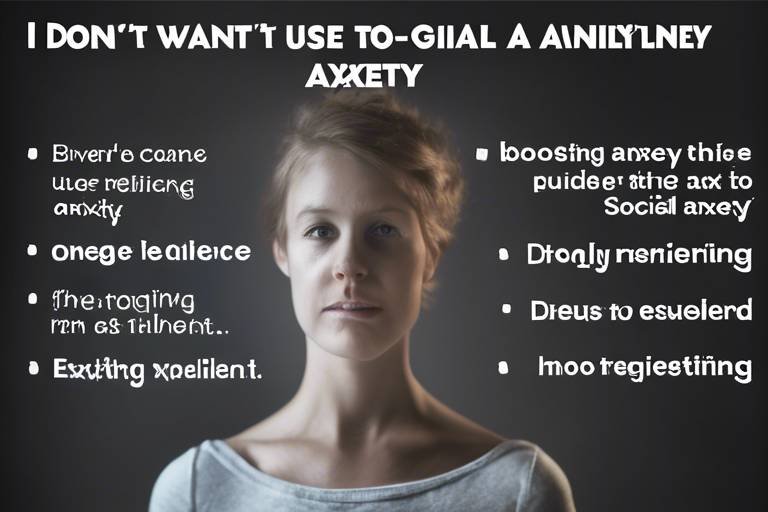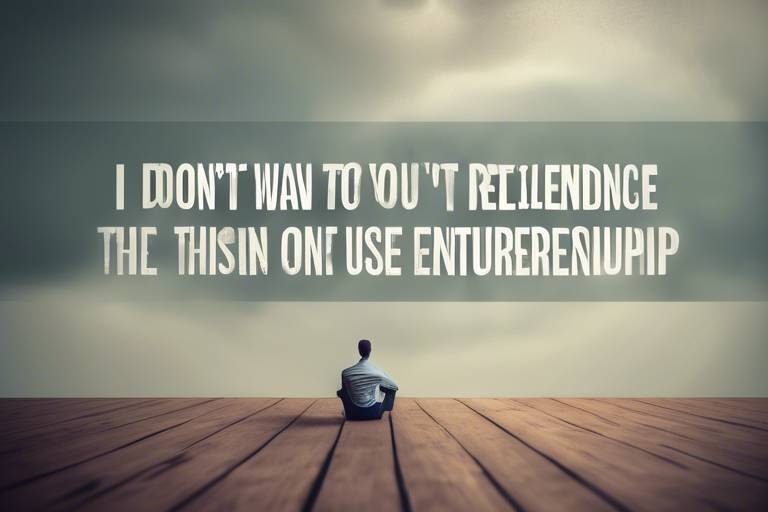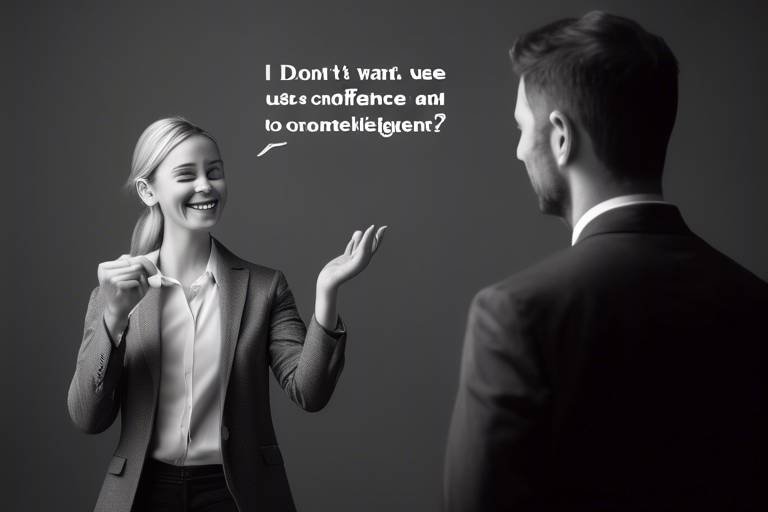Can Confidence Increase Your Problem-Solving Skills?
Have you ever found yourself stuck in a tricky situation, grappling with a problem that seems insurmountable? It’s a common scenario, and what if I told you that the key to unlocking effective solutions might just lie in your level of confidence? That's right! Confidence isn’t just about strutting into a room and commanding attention; it’s a powerful tool that can significantly enhance your problem-solving skills. When you believe in yourself, you’re more likely to approach challenges with a clear mind, innovative ideas, and a willingness to take risks. In this article, we’ll explore how self-assurance can elevate your critical thinking, creativity, and decision-making abilities, ultimately leading to a treasure trove of effective solutions across various situations.
To truly understand the relationship between confidence and problem-solving, we need to dive into the psychology behind it. Confidence is not just a fleeting feeling; it’s deeply rooted in our cognitive processes. Studies have shown that individuals who possess a strong sense of self-belief tend to perform better in problem-solving tasks. This isn’t mere speculation; it’s backed by research in psychology that links self-efficacy—the belief in one’s ability to succeed—with enhanced cognitive performance. When you feel confident, your brain is wired to think more clearly, analyze situations better, and ultimately, arrive at solutions more effectively.
Critical thinking is the backbone of effective problem-solving. It involves analyzing information, evaluating different options, and making informed decisions. But how does confidence play into this? When you’re self-assured, you’re more likely to engage in critical thinking without second-guessing yourself. You’re equipped to weigh the pros and cons of various solutions and choose the best course of action with conviction. This confidence allows you to navigate through complexities with a level head, which is essential when facing tough challenges.
Self-efficacy is a crucial component of confidence that directly influences problem-solving. It’s all about believing in your capabilities. When you have high self-efficacy, you approach problems with a can-do attitude, viewing challenges as opportunities rather than obstacles. This mindset is transformative! It encourages you to tackle issues head-on, knowing that you have the skills to find a solution. Cultivating self-efficacy is an ongoing process that can be achieved through various strategies, which we’ll discuss shortly.
So, how can you build this powerful self-efficacy? Here are some practical strategies:
- Set Achievable Goals: Start with small, attainable goals that gradually increase in difficulty. Each success will boost your confidence.
- Seek Feedback: Constructive feedback from peers or mentors can provide insights into your strengths and areas for improvement, reinforcing your belief in your abilities.
- Reflect on Past Successes: Remind yourself of previous challenges you’ve overcome. This reflection can serve as a reminder of your capabilities.
Let’s look at some real-life examples to illustrate the power of self-efficacy in problem-solving. Consider a student preparing for a challenging exam. A student with high self-efficacy believes they can master the material, leading them to study effectively and seek help when needed. In contrast, a student lacking confidence might avoid studying altogether due to fear of failure. The difference in outcomes is stark! Those with high self-efficacy not only perform better academically but also develop resilience in facing future challenges.
Fear of failure can be a significant roadblock to effective problem-solving. It can paralyze you, making you hesitant to take the necessary risks to find innovative solutions. However, confidence can act as a shield against this fear. When you believe in your abilities, you’re more likely to embrace challenges and view failures as learning experiences rather than dead ends. This shift in perspective is crucial for fostering a culture of innovation and creativity in problem-solving.
Confidence doesn’t just enhance critical thinking; it also fosters creativity. When you feel self-assured, you’re more likely to think outside the box and explore unconventional solutions. This creative approach can lead to breakthroughs that might not have been considered otherwise. The relationship between confidence and creativity is symbiotic; as your confidence grows, so does your ability to innovate.
Want to tap into your creative potential? Here are some techniques that can help:
- Brainstorming: Gather your thoughts without judgment. Write down every idea that comes to mind, no matter how wild it seems!
- Mind Mapping: Visualize your thoughts and ideas. This technique can help you see connections and develop new solutions.
Finally, let’s not overlook the power of a positive mindset. A positive outlook fuels both confidence and creativity. When you approach problems with optimism, you’re more likely to see potential solutions rather than dwelling on the negatives. This positivity not only enhances your problem-solving abilities but also builds resilience in the face of challenges. Adopting an optimistic perspective can significantly improve your outcomes, turning obstacles into stepping stones.
Q: Can anyone increase their confidence for better problem-solving?
A: Absolutely! Confidence can be developed through practice, self-reflection, and by setting achievable goals.
Q: How long does it take to build self-efficacy?
A: Building self-efficacy is a gradual process. With consistent effort, you can start seeing improvements in your confidence and problem-solving skills within weeks.
Q: Are there specific exercises to boost creativity?
A: Yes! Techniques like brainstorming, mind mapping, and engaging in creative hobbies can significantly enhance your creative problem-solving abilities.

The Psychology of Confidence
Confidence is more than just a buzzword; it’s a powerful psychological tool that can significantly influence our ability to solve problems. When we delve into the psychology of confidence, we uncover fascinating insights into how our beliefs about ourselves can shape our cognitive performance. Studies have shown that individuals who possess a strong sense of self-belief are more likely to engage in critical thinking and approach challenges with a positive mindset. But what exactly drives this connection between confidence and problem-solving?
At its core, confidence is rooted in our self-perception. It’s the lens through which we view our capabilities and potential. Theories such as Bandura's Social Cognitive Theory emphasize the importance of self-efficacy—our belief in our ability to succeed in specific situations. This belief acts as a catalyst, motivating us to tackle challenges head-on, rather than shying away from them. When we feel confident, our brains are more likely to engage in higher-order thinking, allowing us to analyze problems, evaluate options, and make informed decisions with greater ease.
Research has demonstrated that confidence can lead to improved cognitive flexibility, which is our ability to adapt our thinking and approach when faced with new information or unexpected challenges. For instance, a confident individual is more likely to consider multiple perspectives and alternative solutions, enhancing their problem-solving repertoire. This is crucial in today’s fast-paced world, where the ability to pivot and think creatively can set one apart from the crowd.
Moreover, the psychological benefits of confidence extend beyond mere problem-solving. When we believe in ourselves, we experience lower levels of anxiety and stress. This reduction in negative emotions allows our cognitive resources to be allocated more effectively towards finding solutions rather than getting bogged down by self-doubt. In essence, confidence not only influences how we approach problems but also how we manage our emotional responses to them.
To illustrate the impact of confidence on problem-solving, let’s consider the following table that summarizes key psychological factors:
| Psychological Factor | Impact on Problem-Solving |
|---|---|
| Self-Efficacy | Enhances motivation and persistence in tackling challenges. |
| Cognitive Flexibility | Encourages exploration of multiple solutions and adaptability. |
| Emotional Regulation | Reduces anxiety, allowing for clearer thinking and decision-making. |
In summary, the psychology of confidence plays an integral role in shaping our problem-solving abilities. By understanding how self-belief influences our cognitive processes, we can take proactive steps to cultivate a more confident mindset. So, how can we harness this knowledge to enhance our own problem-solving skills? The answer lies in developing strategies that bolster our self-efficacy and encourage a positive outlook, which we will explore in the following sections.

Confidence and Critical Thinking
Critical thinking is the backbone of effective problem-solving, acting as a guiding light through the murky waters of complex decisions. But what happens when you sprinkle a little confidence into the mix? Well, it turns out that self-assurance can significantly enhance your critical thinking abilities. When you believe in your capacity to analyze situations and evaluate options, you're not just a passive observer; you're an active participant in the problem-solving process. This self-belief empowers you to engage more deeply with the task at hand, making it easier to dissect problems and arrive at informed decisions.
Consider this: when you're confident, you're more likely to approach challenges with a curious mindset. Instead of shying away from difficult questions, you tackle them head-on. This shift in perspective allows you to explore various angles of a problem, leading to more comprehensive solutions. Studies have shown that individuals who exhibit higher levels of confidence tend to ask better questions, seek out diverse viewpoints, and apply critical thinking skills more effectively. Essentially, confidence acts as a catalyst, transforming the way you engage with problems.
Moreover, confidence not only enhances your analytical skills but also encourages a more open-minded approach to evaluating different options. When you're self-assured, you're less likely to cling to preconceived notions or fear criticism. This openness fosters a richer exploration of potential solutions, allowing you to weigh the pros and cons of each option more thoroughly. In a world where decisions can have far-reaching consequences, this ability to critically assess various choices is invaluable.
To illustrate this point further, let's look at a practical example. Imagine you're working on a team project with a tight deadline. A confident team member is likely to voice their ideas without hesitation, sparking discussions that can lead to innovative solutions. In contrast, a less confident individual might hold back, fearing their contributions won’t be valued. This reluctance can stifle creativity and hinder the team's overall problem-solving effectiveness.
In summary, confidence is not merely a feel-good trait; it plays a crucial role in enhancing critical thinking and decision-making. By fostering self-assurance, you empower yourself to analyze situations more deeply, evaluate options more thoroughly, and ultimately arrive at solutions that are not only effective but also innovative. So, the next time you face a challenging problem, remember that confidence could be your secret weapon in unlocking your full problem-solving potential.
- How does confidence affect decision-making? Confidence allows individuals to make decisions more decisively and with greater clarity, reducing second-guessing and hesitation.
- Can anyone improve their confidence? Yes! Confidence can be cultivated through practice, setting achievable goals, and seeking constructive feedback.
- What role does confidence play in teamwork? In a team setting, confidence encourages open communication and collaboration, leading to more dynamic and effective problem-solving.

The Role of Self-Efficacy
Self-efficacy is a term coined by psychologist Albert Bandura, and it refers to an individual's belief in their own abilities to achieve specific goals or tasks. This belief is not just a fleeting thought; it profoundly influences how we approach challenges and solve problems. When you have high self-efficacy, you're more likely to tackle challenges head-on, rather than shying away from them. It’s like having a secret weapon in your arsenal that boosts your confidence and equips you to face obstacles with resilience.
Imagine you're preparing for a big presentation at work. If you believe you can deliver it successfully, you're more likely to prepare thoroughly and engage with your audience effectively. Conversely, if you doubt your abilities, you may avoid preparation or even decline the opportunity altogether. This illustrates how self-efficacy can shape not only our actions but also our potential outcomes.
Research has shown that self-efficacy is crucial in various domains, including education, health, and workplace performance. A study published in the Journal of Applied Psychology found that employees with high self-efficacy are more likely to embrace challenges and persist through difficulties, ultimately leading to better job performance. This connection underscores the importance of fostering self-efficacy in both personal and professional settings.
But how can we cultivate self-efficacy? Here are some effective strategies:
- Set Achievable Goals: Start with small, attainable goals that gradually increase in difficulty. Achieving these goals boosts your confidence and reinforces your belief in your abilities.
- Seek Feedback: Constructive feedback from peers or mentors can provide valuable insights and affirm your capabilities, helping you to build a more robust sense of self-efficacy.
- Visualize Success: Take a moment to imagine yourself succeeding in your tasks. Visualization can enhance your self-belief and prepare your mind for success.
Additionally, surrounding yourself with supportive individuals who encourage your efforts can significantly enhance your self-efficacy. When you see others succeed, it inspires you to believe that you can achieve similar outcomes. This social modeling is a powerful motivator and can help you overcome self-doubt.
Ultimately, self-efficacy plays a pivotal role in problem-solving. When you believe in your ability to find solutions, you’re more likely to engage in critical thinking and explore creative avenues. Just like a skilled sailor navigating through stormy seas, those with high self-efficacy can steer through challenges with confidence, leading them to successful resolutions. This self-assuredness not only enhances individual performance but can also positively impact team dynamics, fostering a collaborative environment where innovative problem-solving thrives.

Building Self-Efficacy
Building self-efficacy is like constructing a sturdy foundation for a house; without it, everything else can crumble. To enhance your belief in your problem-solving abilities, you need to take deliberate steps that not only challenge your skills but also reinforce your confidence. One effective approach is to set achievable goals. When you break down larger tasks into smaller, manageable objectives, each success you achieve builds upon the last, creating a powerful cycle of positive reinforcement. This method not only makes the overall task less daunting but also provides a series of small wins that can significantly boost your self-efficacy.
Another vital strategy is to seek feedback. Feedback acts as a mirror, reflecting your strengths and areas for improvement. It’s essential to surround yourself with supportive individuals who can provide constructive criticism. This feedback loop helps you understand where you excel and where you might need to put in more effort, ultimately guiding your learning process. Remember, the goal is to view feedback as a tool for growth rather than a judgment of your abilities. By embracing this mindset, you can cultivate resilience and adaptability, which are crucial for problem-solving.
Moreover, observing role models can be incredibly beneficial. When you see others successfully navigating challenges, it can inspire you to believe that you, too, can overcome obstacles. This phenomenon is often referred to as vicarious experience. By learning from others' journeys, you can adopt similar strategies and mindsets that lead to success. Whether it’s a mentor, a colleague, or even someone you admire from afar, their experiences can serve as a roadmap for your own path to greater self-efficacy.
In summary, building self-efficacy is a multifaceted process that involves setting achievable goals, actively seeking feedback, and learning from the experiences of others. By implementing these strategies, you’re not just enhancing your problem-solving skills; you’re also fostering a mindset that embraces challenges with confidence and resilience. So, why not start today? Take that first step towards believing in your capabilities, and watch as your problem-solving skills flourish!

Self-Efficacy in Action
When we talk about self-efficacy, we're diving into a concept that’s all about believing in your own capabilities. Imagine you're facing a complex problem at work, like managing a team project with tight deadlines. If you have high self-efficacy, you're likely to approach this challenge with a sense of optimism and determination. You see obstacles as opportunities rather than roadblocks. This mindset can significantly impact how you tackle the task at hand.
Take, for instance, the story of Sarah, a marketing manager who was tasked with launching a new product. Initially, she felt overwhelmed by the competition and the pressure to deliver results. However, Sarah had spent years cultivating her self-efficacy through small wins and continuous learning. She had a track record of successfully managing projects, which gave her the confidence to believe she could do it again. As she faced the challenges of the product launch, she approached each obstacle with a problem-solving attitude, which ultimately led to a successful launch.
But how does this translate into real-world applications? Let’s break it down:
- Embracing Challenges: Individuals with high self-efficacy are more likely to take on challenging tasks because they believe they can succeed.
- Persistence in the Face of Setbacks: When faced with difficulties, they don’t give up easily. Instead, they view setbacks as learning experiences.
- Seeking Out Opportunities: High self-efficacy encourages individuals to seek out new opportunities, whether it’s taking on a leadership role or proposing innovative ideas in meetings.
Moreover, self-efficacy isn’t just about individual performance; it can also influence team dynamics. When team members believe in their own capabilities, they contribute more effectively, share ideas freely, and support each other in overcoming challenges. This synergy can lead to innovative solutions that might not have emerged in a less confident environment.
In a nutshell, self-efficacy is like a superpower in the realm of problem-solving. It empowers individuals to tackle challenges head-on, learn from their experiences, and ultimately achieve their goals. When you believe you can do something, you're already halfway there!
Q: What is self-efficacy?
A: Self-efficacy is the belief in one’s ability to succeed in specific situations or accomplish a task. It plays a crucial role in how we approach challenges and our overall motivation.
Q: How can I improve my self-efficacy?
A: You can improve your self-efficacy by setting achievable goals, seeking constructive feedback, and reflecting on past successes to build confidence in your abilities.
Q: Can self-efficacy affect team performance?
A: Yes, when team members possess high self-efficacy, they are more likely to collaborate effectively, share ideas, and support each other, leading to improved overall performance.
Q: What role does self-efficacy play in creativity?
A: High self-efficacy can enhance creativity by encouraging individuals to take risks and explore unconventional solutions, fostering an environment where innovative ideas can flourish.

Overcoming Fear of Failure
Fear of failure is a common barrier that many individuals face, often paralyzing their ability to tackle problems head-on. This overwhelming sense of dread can stem from various sources, including past experiences, societal pressure, or even personal expectations. When we allow this fear to take control, it can cloud our judgment and stifle our creativity, making it challenging to explore innovative solutions. But here’s the kicker: confidence can be a powerful antidote to this fear, enabling us to break free from the shackles of self-doubt.
Think about it: when you're confident in your abilities, you're more likely to view challenges as opportunities rather than threats. This shift in perspective allows you to approach problems with a sense of curiosity and resilience. Instead of worrying about what could go wrong, you start focusing on what could go right. Confidence transforms fear into motivation, pushing you to take calculated risks that can lead to groundbreaking solutions.
One effective strategy for overcoming fear of failure is to reframe your mindset. Instead of seeing failure as a negative outcome, consider it a stepping stone to success. Each setback can provide valuable lessons that contribute to your growth. When you embrace this perspective, you’ll find that the fear of failure diminishes, and you become more willing to experiment and innovate. Here are some practical steps to help you cultivate this mindset:
- Shift your focus: Concentrate on the potential benefits of taking action rather than the risks of failure.
- Set realistic expectations: Understand that perfection is unattainable, and mistakes are part of the learning process.
- Visualize success: Picture yourself overcoming obstacles and achieving your goals, which can boost your confidence and reduce anxiety.
Moreover, surrounding yourself with a supportive network can significantly enhance your confidence. Engaging with friends, mentors, or colleagues who encourage you can provide the reassurance needed to face challenges head-on. When you share your fears and aspirations with others, you often discover that you’re not alone in your struggles. This sense of community can be incredibly empowering, reminding you that failure is not a reflection of your worth but rather a natural part of the journey.
In conclusion, overcoming the fear of failure is not just about building confidence; it's about reshaping your entire approach to problem-solving. By reframing your mindset, embracing a supportive community, and focusing on the lessons learned from setbacks, you can transform fear into a catalyst for growth. Remember, every great innovator has faced failure at some point—what sets them apart is their unwavering belief in their ability to overcome it. So, the next time you feel that familiar pang of fear, take a deep breath, trust in your capabilities, and dive into the challenge ahead!
Q: How can I build my confidence to tackle problems more effectively?
A: Building confidence involves setting achievable goals, seeking feedback, and celebrating small victories. Surrounding yourself with supportive people can also help reinforce your self-belief.
Q: What are some techniques to manage fear of failure?
A: Techniques include reframing your mindset to view failure as a learning opportunity, visualizing success, and sharing your fears with a supportive network.
Q: Why is confidence important in problem-solving?
A: Confidence enhances your ability to analyze situations, evaluate options, and make informed decisions, ultimately leading to more effective solutions.

Creative Problem-Solving
When it comes to tackling challenges, creativity is often the secret sauce that transforms a mundane solution into something extraordinary. Confidence plays a pivotal role in this creative process. When we believe in our abilities, we're more likely to venture beyond conventional boundaries, exploring uncharted territories in our thinking. Have you ever noticed how some people seem to come up with brilliant ideas effortlessly? A lot of it has to do with their self-assurance, which allows them to embrace the unknown without the paralyzing fear of judgment or failure.
In fact, a confident mindset can act as a catalyst for innovation. It encourages individuals to brainstorm freely, share ideas without hesitation, and collaborate openly with others. This collaborative spirit can lead to a melting pot of diverse perspectives, which is crucial for innovative problem-solving. Think of it as mixing different colors on a palette; the more colors you have, the more vibrant and unique your final masterpiece will be. When teams feel confident, they are more likely to engage in creative dialogues that push the envelope of traditional problem-solving.
Moreover, confidence empowers individuals to take calculated risks. Imagine you’re standing at the edge of a diving board, looking down at the water below. If you’re filled with doubt, you might hesitate or even back away. But if you’re confident in your ability to dive, you’ll leap into the water without a second thought. This leap of faith is akin to how we approach problem-solving. When we trust ourselves, we’re more willing to explore unconventional solutions and experiment with different approaches. This willingness to take risks can lead to breakthroughs that would otherwise remain undiscovered.
To foster creativity, we can implement several techniques that encourage a confident mindset. Here are a few strategies:
- Brainstorming Sessions: Gather a group of people and throw out ideas without criticism. This open environment boosts confidence and often leads to unexpected solutions.
- Mind Mapping: Visualize ideas and concepts. This technique allows you to see relationships between different elements, sparking new connections.
- Role-Playing: Step into different perspectives. By adopting various roles, you can view problems from multiple angles, enhancing creative solutions.
But it’s not just about techniques; the mindset we cultivate also matters immensely. A positive outlook can significantly enhance our creative problem-solving abilities. When we approach challenges with optimism, we open ourselves up to possibilities rather than limitations. This positive mindset fosters resilience, allowing us to bounce back from setbacks and view them as opportunities for learning and growth. It’s like viewing a rainy day not as a nuisance but as a chance to enjoy the refreshing scent of wet earth and the vibrant colors of nature.
In conclusion, confidence is not merely a personality trait; it’s a powerful tool in the arsenal of creative problem-solving. By nurturing self-assurance, we can unlock our full potential and tackle challenges with a fresh perspective. The more confident we become in our abilities, the more innovative solutions we can discover, leading to success in both personal and professional realms.
Q1: How can I improve my confidence in problem-solving?
A1: Start by setting small, achievable goals and celebrating your successes. Seek feedback from others and practice self-reflection to understand your strengths.
Q2: What are some common barriers to creative problem-solving?
A2: Fear of failure, self-doubt, and rigid thinking can hinder creativity. Overcoming these barriers often involves cultivating a supportive environment and adopting a growth mindset.
Q3: Can teamwork enhance creative problem-solving?
A3: Absolutely! Collaborative efforts often lead to a blend of ideas and perspectives, which can spark innovative solutions that an individual might not have considered alone.

Techniques to Boost Creativity
Creativity is the lifeblood of effective problem-solving, and boosting it can often feel like trying to catch smoke with your bare hands. However, there are several techniques that can help you tap into that elusive well of ideas and solutions. One effective method is brainstorming. This technique encourages free thinking and the generation of a multitude of ideas without immediate criticism. Imagine a room filled with people throwing out ideas like confetti; the more ideas, the better! The key here is to create a safe space where everyone feels comfortable sharing their thoughts, no matter how outlandish they may seem. This can lead to unexpected connections and innovative solutions.
Another powerful technique is mind mapping. This visual tool allows you to organize your thoughts and see the relationships between different concepts. Picture a spider web, with your main idea at the center and various strands leading to related thoughts. Mind mapping not only helps clarify your thinking but also stimulates new ideas by visually connecting different pieces of information. You can create a mind map on a whiteboard, a piece of paper, or even using digital tools. The act of visually laying out your thoughts can often spark creativity in ways that linear note-taking simply can’t.
Additionally, consider incorporating divergent thinking exercises into your routine. This approach encourages breaking away from traditional thought patterns and exploring multiple possible solutions. For instance, challenge yourself to come up with as many uses as possible for a common object, like a paperclip. You might start with the obvious—holding papers together—but soon you'll find yourself thinking outside the box, perhaps using it as a makeshift zipper pull or even a keychain. This kind of exercise not only enhances your creative thinking but also trains your brain to approach problems from different angles.
Moreover, don't underestimate the power of collaboration. Working with others can introduce new perspectives and ideas that you might not have considered on your own. When you engage in discussions with people from diverse backgrounds, you open yourself up to a wealth of knowledge and experiences. This collaborative environment can lead to a rich exchange of ideas, fostering creativity in ways that solitary brainstorming simply cannot achieve.
Lastly, maintaining a positive mindset is crucial for fostering creativity. When you approach challenges with an optimistic outlook, your brain is more likely to explore new ideas and solutions. Embrace mistakes as learning opportunities rather than setbacks. Remember, every great invention started as a wild idea that someone believed in. Cultivating a positive environment, whether it be through affirmations, surrounding yourself with supportive people, or simply taking time to appreciate small victories, can significantly enhance your creative problem-solving abilities.
In conclusion, boosting creativity is not just about having a 'Eureka!' moment; it's about creating an environment where ideas can flow freely. By utilizing techniques like brainstorming, mind mapping, divergent thinking, collaboration, and maintaining a positive mindset, you can enhance your creative problem-solving skills. So, the next time you face a challenge, remember these techniques and watch as your creativity flourishes!
- What is brainstorming and how does it help creativity?
Brainstorming is a technique where individuals generate a large number of ideas without judgment. It encourages free thinking and can lead to innovative solutions.
- How does mind mapping work?
Mind mapping is a visual representation of ideas and concepts that helps organize thoughts and stimulate new ideas by showing relationships between information.
- What is divergent thinking?
Divergent thinking is a way of generating multiple solutions to a problem, encouraging creativity by exploring various possibilities rather than settling for the first idea.
- Why is collaboration important for creativity?
Collaboration brings together diverse perspectives and experiences, which can lead to richer discussions and more innovative solutions than working alone.
- How can I maintain a positive mindset to boost creativity?
Maintaining a positive mindset involves embracing mistakes as learning opportunities, practicing self-affirmation, and surrounding yourself with supportive people.

The Impact of a Positive Mindset
Having a positive mindset can be a game changer when it comes to problem-solving. It's like having a superpower that allows you to tackle challenges with a sense of optimism and resilience. When you approach a problem with a positive attitude, you're not just seeing it as an obstacle; you're viewing it as an opportunity for growth and learning. This shift in perspective can significantly enhance your ability to find effective solutions.
Research shows that individuals with a positive mindset are more likely to engage in creative problem-solving. They are open to exploring new ideas and possibilities, which can lead to innovative solutions that others might overlook. Imagine being in a brainstorming session where everyone is focused on the negatives; it can feel stifling. But when someone brings a positive attitude into the mix, it can spark a wave of creativity, encouraging others to think outside the box and contribute their ideas freely.
Moreover, a positive mindset fosters resilience. Life is full of ups and downs, and facing setbacks is inevitable. However, individuals who maintain a positive outlook are more likely to bounce back from failures. They view challenges as temporary hurdles rather than permanent roadblocks. This resilience not only helps them to navigate through difficulties but also boosts their confidence in their problem-solving abilities. They believe that, no matter the challenge, they have the capacity to overcome it.
To illustrate the impact of a positive mindset, consider the following table that summarizes key benefits:
| Benefit | Description |
|---|---|
| Enhanced Creativity | Positive thinkers are more open to new ideas and solutions. |
| Increased Resilience | They recover from setbacks quickly and maintain motivation. |
| Improved Collaboration | A positive attitude encourages teamwork and open communication. |
| Better Decision-Making | Optimism leads to more thorough analysis of options and outcomes. |
In addition to these benefits, cultivating a positive mindset can also improve your overall well-being. When you focus on the good, you're more likely to experience lower stress levels and better mental health. This holistic improvement can further enhance your cognitive functions, making you even more adept at problem-solving.
So, how can you cultivate a positive mindset? Start by practicing gratitude. Take a moment each day to reflect on what you appreciate in your life. This simple act can shift your focus from what's going wrong to what's going right. Surround yourself with positive influences, whether it's uplifting friends, inspiring books, or motivational podcasts. The more positivity you expose yourself to, the more it will seep into your own mindset.
In conclusion, a positive mindset is not just a feel-good concept; it's a powerful tool that can enhance your problem-solving skills. By embracing optimism, you can unlock your creative potential, build resilience, and improve your overall decision-making abilities. So, the next time you face a challenge, remember: your mindset can make all the difference.
- How can I develop a positive mindset? Start by practicing gratitude, surrounding yourself with positive influences, and challenging negative thoughts.
- What are the benefits of a positive mindset in problem-solving? A positive mindset enhances creativity, resilience, collaboration, and decision-making abilities.
- Can a positive mindset really improve my mental health? Yes! Focusing on the positive can reduce stress and improve overall well-being.
Frequently Asked Questions
-
How does confidence affect problem-solving skills?
Confidence plays a crucial role in enhancing problem-solving skills. When you believe in your abilities, you're more likely to engage in critical thinking and explore various solutions. This self-assurance encourages you to tackle challenges head-on rather than avoiding them, ultimately leading to more effective outcomes.
-
What is self-efficacy and why is it important?
Self-efficacy refers to your belief in your own capabilities to achieve specific goals. It's essential because a high level of self-efficacy can boost your motivation, resilience, and willingness to take on complex problems. When you trust your skills, you're more inclined to think creatively and remain persistent in finding solutions.
-
Can fear of failure impact my problem-solving abilities?
Absolutely! Fear of failure can create a mental block, preventing you from exploring innovative solutions. However, building confidence can help mitigate this fear, allowing you to embrace risks and view challenges as opportunities for growth rather than threats.
-
What techniques can I use to boost my creativity in problem-solving?
There are several effective techniques to enhance creativity, such as brainstorming sessions, mind mapping, and engaging in collaborative discussions. These methods encourage out-of-the-box thinking and can lead to unique solutions that you might not have considered otherwise.
-
How does a positive mindset influence problem-solving?
A positive mindset can significantly impact your approach to problem-solving. When you maintain an optimistic outlook, you're more likely to remain resilient in the face of challenges and open to new ideas. This positivity fosters confidence, which in turn enhances both your creativity and critical thinking abilities.



















